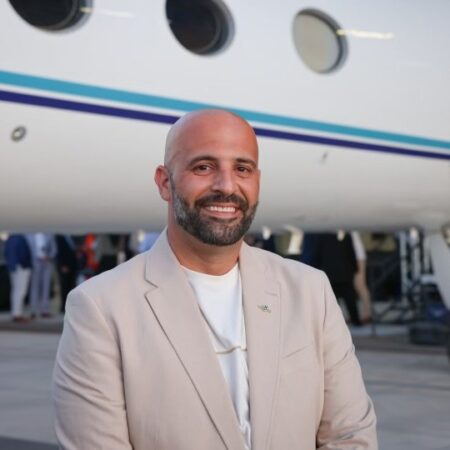Words by Kirstie Pickering
Since the onset of the pandemic, business aviation has seen a huge increase in workload as demand for services surged. This has had a significant impact on those working in the industry.
According to research published in 2022 by the Lived Experience and Wellbeing Project – a Trinity College Dublin hub that studies aviation worker wellbeing – only 47% said their mental health was very good or good, and 77% cited Covid-19 as having a negative impact on their wellbeing.
“The business aviation industry in general has been trying to overlook mental health problems,” says Alina Minaeva, director of private jets at Volanteus. “The private jet industry can be very stressful. The older generation consider it is normal to face tense situations every day, because it has been the same for decades.
“Mental health is a very important subject right now. Both employees and employers should understand that it will benefit the business more if everyone is in a good physical and mental health.”
Covid-19’s impact

Mental health results in sick days. Around 17 million working days were lost in the UK alone due to mental health-related illness in 2022. Mohammed Al Husary, executive president at UAS, says business aviation workers are having to work longer hours and with less rest, and many are feeling burnt out.
“The industry is having to quickly adapt to new safety protocols and regulations that have been implemented to protect passengers and staff,” says Al Husary. “To maintain a high level of safety and quality, many companies are investing in new technologies and training to ensure that their staff are up to date with the latest standards.”
Covid-19 has increased mental health concerns in aviation. A recent study by Trinity College Dublin found that 72% of aviation workers acknowledge their mental health has worsened since the pandemic.
“At Volanteus we didn’t furlough anyone, but instead repurposed the team to support the busy areas,” says Minaeva. “However, many other companies either furloughed staff or made them redundant. Then, as we came through the pandemic and borders reopened, there was a sharp increase in demand for private jet charters and many companies and operators found themselves short-staffed.
“As a result, people faced longer hours and had to work much harder to keep up with the increased demand – quality also dropped within the industry due to the shortage of well-qualified personnel.”
Reyné O’Shaughnessy, founder of Piloting 2 Wellbeing and CEO at the Aviation Health and Wellbeing Institute, says there are two factors that have a huge impact on mental health and wellbeing in aviation – workload and cognitive workload.
From dispatchers to pilots, she says aviation workers are constantly being inundated with information from multiple sources. O’Shaughnessy notes that people’s ability to digest, process and act upon all of the information coming in can be a massive challenge on top of an already demanding profession.
“Multitasking and prioritizing work is a must,” says O’Shaughnessy. “When you combine both workload and cognitive overload challenge together, the resulting impact on stress levels can be significant. We have seen many cases where it has actually led to physical and mental health issues amongst pilots.”
The role of staffing
The pandemic has reduced the overall talent pool within the industry, making it harder to recruit experienced professionals. This talent shortage means workloads fell on workers already operating at full capacity, but this impact is gradually improving.
“During the pandemic, there were less people trying to do the same amount of work. In some cases the workload increased as companies worked to stay relevant to their customers,” says Jo Damato, senior vice president, education, training and workforce development at NBAA.
“That led to higher stress levels, fatigue and burnout. Now staffing levels are better, but employers need to remember they asked so much of their employees during the hard times. It’s not just like flipping a switch and everyone is back to who they were in January 2020. Employers need to invest in the wellbeing of their people if they are going to have success.”
Changing perspectives

Attitudes to addressing and discussing mental health concerns are improving in business aviation. Despite some believing these changes have been slow to come into effect, the change in perspectives is having a positive impact on workers in the industry overall.
“The attitude towards mental health in the business aviation industry is improving, but there is still work to be done like in any sector,” says Róman Kok, from the EBAA.
“Employers should recognize the importance of mental health and wellbeing and take proactive steps to support their employees. This includes providing access to mental health resources, creating a culture that promotes work-life balance and mental wellness, and encouraging open communication and dialogue.”
Despite the conversation about mental health opening up, there is still a gap when it comes to the approach of different generations.
“As the first generation to grow up with the internet and social media being readily available since birth, GenZs are more comfortable sharing their personal stories versus baby boomers,” says O’Shaughnessy.
Minaeva agrees, saying that it is noticeable that younger industry professionals face and highlight the mental health problems more readily compared to the older generations.
“Younger people have better awareness of mental health issues and an openness to speak about it, whereas historically there was a stigma attached to mental health and a toxic culture to keep struggles to oneself,” she adds.
Time to do more
With the need for mental health support clear, experts advise managers and organizations to take positive steps to provide support services.
“As part of its commitment to encourage better health, motivation and happiness amongst all employees, UAS has launched the UAS BeWell corporate wellness program,” says Al Husary.
“Employees benefit from information sessions on mental health issues, cancer awareness and health screenings. They also enjoy wellness workshops covering topics like stress management and desktop yoga, and sporting activities and family events.”
Al Husary believes larger organizations should consider creating a chief wellbeing officer role within its C-suite to address mental health support.
“The chief wellbeing officer should lead and implement a corporate wellness strategy,” he says. “Attractive benefits and compensation, a great work life balance, and good leadership culture are vital to retain talent. Personal values aligning with the corporate culture also play a huge role.”
O’Shaughnessy says flexibility plays a key role in mental wellbeing support, as there is no one size fits all solution.
“Workplace flexibility can include flexitime, telecommuting and unlimited paid time off policies,” O’Shaughnessy says.
“For pilots, organizations can use healthier vending machines, transportation to a local gym during layovers, sleep rooms at an FBO, or a contracted day rate at a local hotel,” she adds. “Flexible schedules and pilot amenities provide employees with job satisfaction, better health, increased work-life balance and less stress.”
Damato notes that it is imperative that leadership understand the impact the pandemic had on their employees’ mental health and wellbeing.
She believes that even if someone says they are fine, managers need to look deeper, consider body language and physical appearance, and note how often they see an employee coming in early and staying late.
“Managers probably aren’t experts in mental wellbeing, and they need to be willing to reach out for additional support in this area,” says Damato. “There are companies that specialize in this issue and can help.
“Managers should also look at their hiring numbers. Can they give employees more flexibility in their schedules so they don’t feel like they are on 24/7? They need to understand that compensation doesn’t change the workload and the toll it may take on employees.
“If your company has an employee assistance program, make sure make sure employees aware of it and if there isn’t one, investigate starting an EAP.”
Why is this important?

Making immediate changes to your organization with employee mental health in mind is crucial. Big or small, such investment will help improve overall staff wellbeing and make a positive impact to both their personal life and work output.
“It is important to create a supportive environment for employees so they can feel comfortable to talk about mental health problems,” says Minaeva.
“It is also important to provide access to mental health resources such as mental health training and mental
health medical support, for instance, through the
health insurance.”
Kok notes the importance of communication, adding that managers should ensure that employees have the information they need to do their jobs safely and efficiently. “Managers and companies can further support employee mental health and wellbeing by implementing policies that prioritize work-life balance, offering employee assistance programs, providing training on stress management, and fostering a supportive and inclusive work environment,” he says.
Employee wellness programs are a tried-and-tested way to boost mental wellbeing in business aviation, as proven by UAS. Al Husary lists improving employee health and engagement, increasing productivity, providing a shared purpose, and reducing stress levels and employee burnout as key benefits.
“Investing in employee wellness programs can help to boost morale and create a positive work environment, which can lead to increased motivation, creativity and collaboration among employees,” says Al Husary.
“Comprehensive wellness programs can also reduce healthcare costs and absenteeism, resulting in an overall increase in organizational performance.”
The right steps
In business aviation, there is still work to be done when supporting employee wellness. Al Hasary believes that while there is increasing awareness around the topic, there is still a lack of tangible action. “While pilot fatigue and its associated remedies have long been at the forefront of the conversation, mental health has yet to be acknowledged and addressed in a meaningful way,” he says.
“Very few companies in business aviation have implemented comprehensive employee wellness programs. It was only recently that this issue was discussed at major business aviation events. To truly support employees and help them thrive in their work environment, companies must invest in effective and comprehensive wellness programs.”
Encouraging open communication without judgement is the first step to deploying a positive culture surrounding mental health. Breaking the taboo is important, and must start and be demonstrated by the most senior members of an organization to help normalize it.
“If employees are weary of accepting help and feel threatened by words like therapy or mental wellbeing, look into bringing in coaches who can help employees with challenges in ways that are less clinical,” says Damato.
“Remember, peer support is probably the best tool we all have, so encourage a peer support program at your workplace. No one should go through mental health
problems alone.”





